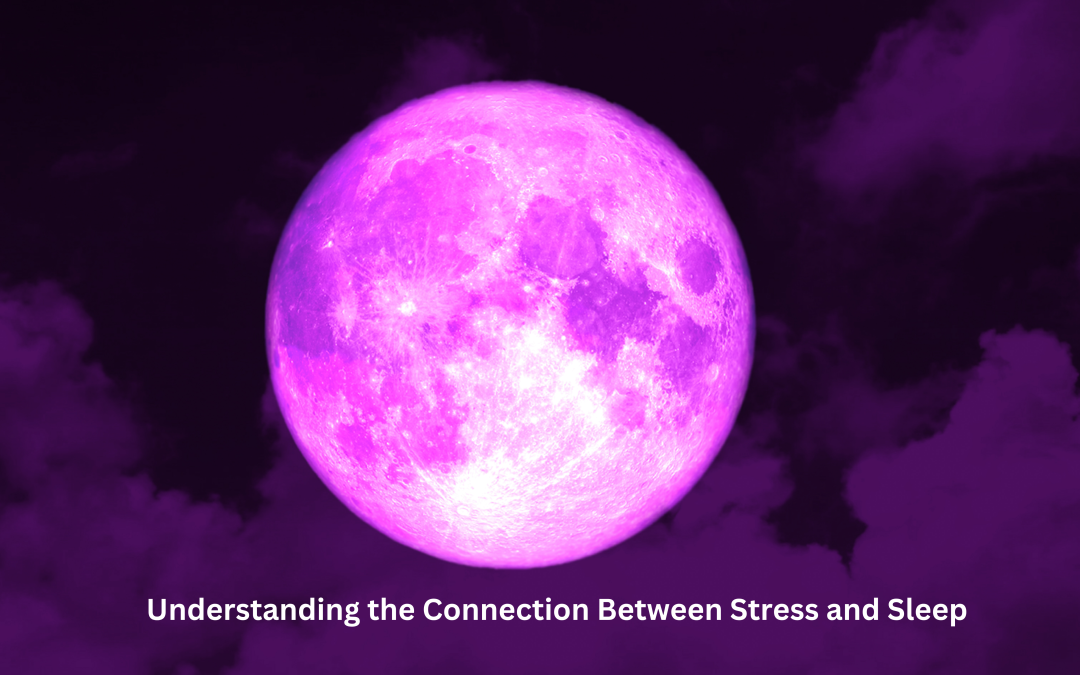It’s 2 a.m.
You’re tired—but your mind is wide awake. You replay conversations, worry about tomorrow, and dread the alarm clock. The harder you try to sleep, the more your body resists.
Sound familiar?
If you find yourself lying awake night after night, overwhelmed and wired, there are other people who feel the same way. The link between stress and sleep is one of the most common (and most frustrating) cycles many people—especially high-achieving women—get stuck in.
So let’s break it down:
Are you stressed because you can’t sleep, or can’t sleep because you’re stressed?
The truth is… it’s both.
The Vicious Cycle Between Stress and Sleep
Stress and sleep have a two-way relationship. When your body is in a prolonged state of stress, it’s hard to relax enough to fall asleep. And when you don’t get enough rest, your stress response becomes even more reactive.
Here’s What’s Happening in Your Body:
- Stress activates your nervous system.
Your brain senses a threat (real or imagined) and triggers the fight-or-flight response, releasing cortisol and adrenaline. Your heart rate speeds up, your muscles tense, and your brain stays on high alert. Not exactly ideal for drifting off. - Sleep deprivation makes your brain more sensitive to stress.
- When you don’t sleep, your amygdala (your brain’s fear center) becomes more reactive, and your prefrontal cortex (the part that regulates thoughts and emotions) slows down. This makes you more emotionally sensitive and less able to cope.
- The cycle repeats.
Poor sleep = more stress. More stress = worse sleep. Left unaddressed, this cycle can lead to burnout, anxiety disorders, and chronic health issues.
Signs You’re Caught in the Stress–Sleep Spiral
You might be stuck in this cycle if:
- You dread going to bed because you know you won’t sleep
- You wake up frequently or too early
- Your mind races with worry the moment your head hits the pillow
- You feel emotionally fragile or irritable the next day
- You rely on caffeine or sugar to push through the day
If that sounds like you, know this: it’s not a personal failure. Your nervous system is trying to protect you. But it needs help learning how to feel safe enough to rest.
Don’t Overlook the Basics: Rule Out Physical and Environmental Factors
Before diving deep into stress relief techniques, it’s essential to rule out other potential barriers to quality sleep. Sometimes the culprit isn’t just mental stress—it could be a mattress that doesn’t support your body, room temperature that’s too hot or cold, or even light or noise pollution in your space. Medical issues like sleep apnea, hormonal changes, or chronic pain can also disrupt your rest. And while alcohol might feel like a nightcap, it actually interferes with REM sleep and makes your sleep less restorative. Start by checking your sleep environment and overall health—it’s often the simplest fixes that make the biggest difference.
How to Break the Cycle: Practical, Science-Backed Tools
You don’t need a perfect 10-step routine or an expensive sleep tracker. You need a few small, consistent shifts that signal to your body: “You’re safe. You can rest now.”
- Stop Trying to Force Sleep
Trying harder to sleep often backfires. Instead, focus on calming your body, not “making” yourself fall asleep. The goal is rest, not perfection.
Try This:
Lie in bed and say to yourself, “It’s okay if I don’t fall asleep right away. Just resting is enough.” This reduces performance pressure and helps calm your nervous system.
- Regulate Your Nervous System Before Bed
A wired body can’t fall asleep. Even 5–10 minutes of nervous system regulation can shift you out of fight-or-flight.
Try This:
- Breathwork: Inhale for 4, exhale for 6 (longer exhales activate your parasympathetic system).
- Progressive muscle relaxation: Tense and release your muscles, one at a time.
- Self-havening or tapping: Gentle, rhythmic touch reduces cortisol and promotes safety.
- Give Your Thoughts a Place to Go
Racing thoughts at night? Your brain is trying to process—not sabotage you.
Try This:
- Brain dump journal: Set a 5-minute timer and write everything that’s on your mind. No filtering. Just get it out.
- Write tomorrow’s top 3 priorities to give your mind closure for the day.
- Limit Stimulants—Including Information
Your brain doesn’t know the difference between emotional stimulation and physical stress. So scrolling TikTok or reading emails at 10 p.m. keeps your mind alert.
Try This:
- Power down blue light screens 30–60 minutes before bed
- Avoid stressful conversations or media late at night
- Try gentle music, white noise, or audiobooks instead
- Shift Your Identity From “Bad Sleeper”
Many people subconsciously tell themselves: “I’ve never been a good sleeper,” or “My body just doesn’t know how to rest.” That identity reinforces the stress response. Instead, practice new language.
Try This:
Tell yourself: “My body can rest. It just needs practice. I’m learning how to create safety for sleep.” It sounds simple, but this mindset shift helps rewire your brain’s relationship to rest.
Final Thoughts: You’re Overstimulated
Sleep isn’t a luxury—it’s a biological need. And your body wants to sleep. If you’re not sleeping, it’s because your nervous system is stuck in survival mode.
With compassion, consistency, and simple regulation tools, you can train your body to move out of stress and into restoration.
